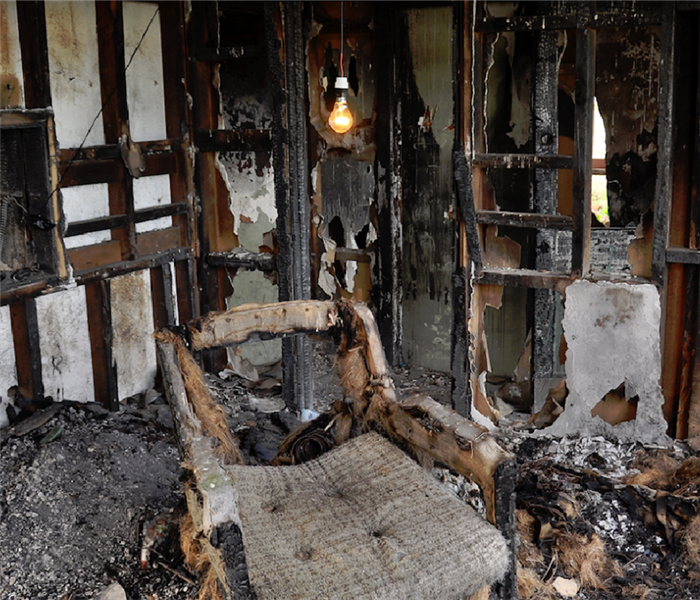Household Newark Kitchen Fire, What Now?
9/27/2020 (Permalink)
SERVPRO is a Leading Fire Damage Restoration Service for Newark Residents.
Why are kitchen fires so common?
Kitchen fires are among the leading causes of house fires for Newark residents. Leaving a stove unattended can lead to sudden combustion involving flammable substances like animal fats or fuel for those with gas ovens. Oil-based flammables reject water, which can make fires uncontrollable. The typical damages associated with a kitchen fire include appliance damage, smoke deposits, or melting of the oven hood and upper wall and ceiling smoke residues. Burnt animal proteins can be odorous as well as challenging to clean using household products. SERVPRO technicians can identify different types of soot deposits and take the necessary steps to return your home to its preloss condition.
What are the most effective ways of removing animal fats from walls?
Protein fire damage in your Newark home can be stubborn and odorous. Protein fires are classifiable as wet smoke because the deposits are greasy. Wet smokes present a challenge as they can bond with surfaces. We recommend performing light vacuuming in the affected area to remove any dry or unbonded soots from the body. Opening windows and ventilating the space can help encourage odors to disperse. However, cleaning the remaining residues is best left to professionals with the correct knowledge, equipment, and cleaning.
What are the tell-tale signs of wet smoke?
- If the source of combustion is oil-based or synthetic, it is likely to produce wet smoke deposits
- Thick, greasy smoke residues that do not mix with water
- Unpleasant odors in the affected area and surrounding rooms
What cleaners remove protein smoke deposits?
When dealing with smoke deposits, it is vital to remember that like dissolves like. Water-based smoke deposits respond to water-based detergents and cleaners. Oil-based smoke, therefore, responds to oil-based solvents. One way of understanding which cleaning products are useful is by testing on a wall's discrete area. If smoke spreads around, then stop- you may have to use a different solvent. SERVPRO technicians seek to use oil-based solvents that can suspend wet smoke particles in the solvent. We can then rinse the wall to remove both the solvent and the smoke particles. It may be necessary to repaint walls after soot to remove soot to return your home to its preloss condition.
How are solvents applied to smoke deposits?
- Mix the solvent to the recommended dilution as per manufacturer instructions
- Apply directly to areas of the wall with smoke damage and allow time for the solvent to suspend soots
- After suspension time, rinse the wall using water with a detergent, place sheets or mats below to avoid further damage
Are kitchen fires solely composed of animal proteins?
While the cause of a kitchen fire in Newark may be an animal fat, the combustion can lead to other materials being burned. Most appliances use a synthetic finish. At high temperatures, these finishes can bubble and melt. Not only do kitchen appliance finishes cause harm to the appliance's surface, but they can also release other toxins into the environment in the form of smoke. Our technicians measure the type of smoke residues by taking pH tests of the smoke residues. Like oil and water-based soot, cleaning fluids should generally be applied to return the smoke deposit to a neutral pH. Alkaline deposits respond best to acidic cleaning fluids, whereas acidic soots respond to alkaline cleaners. SERVPRO technicians conduct extensive testing to mitigate against losses to appliances or other kitchen fittings.
How do professionals counteract fire odors?
- Identify the source of the odor which may be soots or smoke residues and attempt to remove them through cleaning
- Refinish surfaces using odor sealing chemicals and also put in place a drying strategy to reduce moisture
- If odors persist after completing the above actions, fumigate the affected area using misting or ultra-low volume fogging equipment (ULV foggers)
What qualifications are important for fire restoration services?
A fire and smoke restoration technician (FRST) needs to be well-versed in the behavior of fire and the different cleaning detergents and solvents. Also, it can be helpful for technicians to have access to odor control professionals and equipment. It is usual for SERVPRO to dispatch an experienced crew chief, a production technician, and specialists for odor control or drying. It may be necessary to have some general construction training to help rebuild some or parts of your home during the fire restoration. SERVPRO cross-trains crew chiefs and technicians to ensure that you only deal with one company for most of a repair. If third-parties are necessary, we can arrange them on your behalf using trusted local specialists.
Kitchen fires are, unfortunately, one of the most common causes of a house fire. To avoid expensive damages and mitigate odor or soiling, contact SERVPRO of Newark at (302) 733-7933.






 24/7 Emergency Service
24/7 Emergency Service
